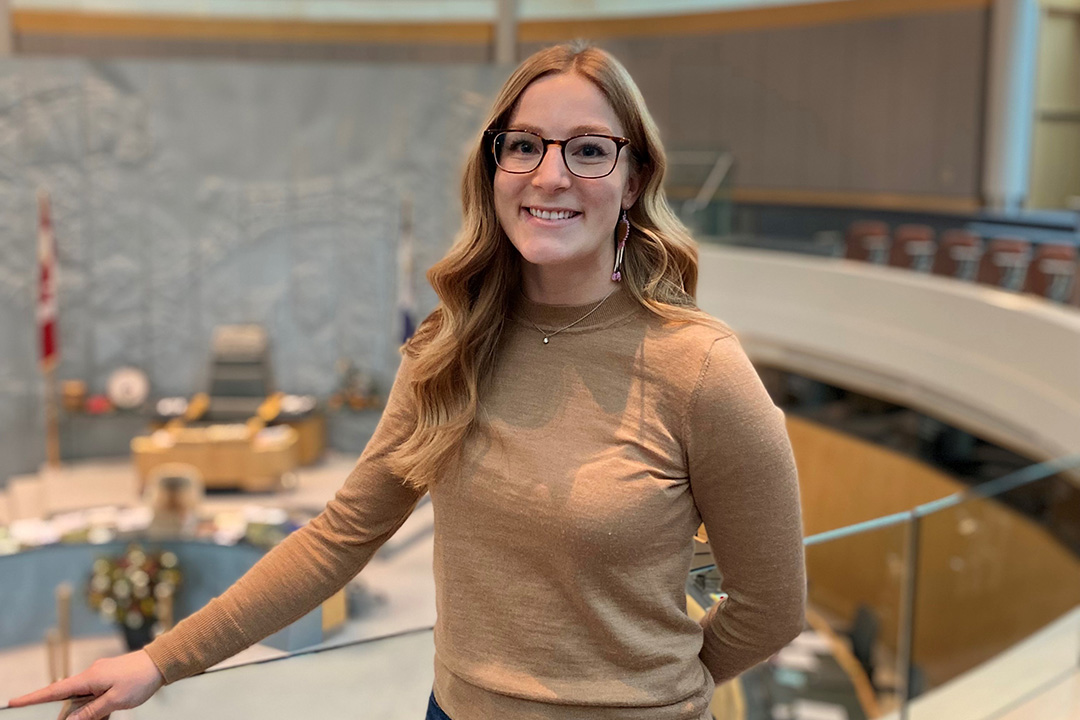
Building capacity in the North
Hannah Hoefer will be graduating this November 9 after completing her online Master of Governance and Entrepreneurship in Northern and Indigenous Areas Program through Johnson Shoyama, and under the guidance of her supervisor Dr. Bram Noble from the University of Saskatchewan (USask) Department of Geography and Planning.
By Scott Larson, Freelance WriterHannah Hoefer likes to say she didn’t find the Master of Governance and Entrepreneurship in Northern and Indigenous Areas (GENI) program, it found her.
A couple of summers ago Hannah Hoefer was working with the Government of the Northwest Territories (GNWT) doing a project looking at university programs that offered instruction on land use planning.
“I stumbled across GENI and I thought this is really peaking my interest,” Hoefer said.
This fall Hoefer will be graduating with her masters from the online Johnson Shoyama Graduate School program.
“I always knew I wanted to do a masters program, but I didn’t really know what I wanted to do or what was the right fit coming from the north,” she said. “I found this program and it was like ‘wow, this is exactly what I didn’t know I needed.’”
Hoefer was born and raised in Yellowknife, Northwest Territories.
She received a BA majoring in psychology and Indigenous studies from the University of Victoria, but always went back home every summer to work doing various jobs with the GNWT.
With a BA in hand, Hoefer knew she wanted to return to the north.
“I think what I find so special about the North is the resilience of our people; no matter the occasion, we always rise towards finding innovative solutions to issues at hand, and we do so in collaboration with all residents,” Hoefer said.
“More than this, the Northwest Territories is full of some of the most welcoming people I've ever met; despite the cold weather, we are people with warm hearts, and always there to help support one another. I knew I wanted to come back and contribute to our continued growth.”
She is currently working as an intern ministerial special advisor, working alongside a member of Cabinet with the GNWT, and is in the process of being signed on as an assistant negotiator.
Hoefer said the GENI program was a perfect fit for her because it allowed her to stay in Yellowknife and offered her plenty of flexibility.
“It was perfect because you can go anywhere and still get that program finished,” she said. “It gave me a lot of opportunities to travel and to explore, and take the time to learn at my own pace.”
As part of her Applied Research Project (a mandatory component of the GENI program) Hoefer led the design, co-ordination, preparation, and presentation of a project titled Remediation and Reconciliation: Exploring Mine Reclamation Capacity for the Yellowknives Dene First Nation (YKDFN).
The project explored what knowledge currently exists to inform Det’on Cho Management LP, the economic branch of the YKDFN, on economic reconciliation by remediating three abandoned mine sites located on YKDFN asserted territory.
And she was able to take advantage of the GENI program’s affiliation with the University of Tromsø and spend a semester as a graduate research assistant with the Centre for Sámi Studies in Norway.
“Having that joint degree from USask and the University of Tromsø provided a wide array of mentors and professors that had different and unique perspectives on northern and Indigenous issues,” she said.
“It provided a huge experience to understand how other circumpolar areas and other northern regions have very similar issues, but the way we approach them can be so different.”
Hoefer said the GENI program was a perfect fit because it allowed her to stay in the North and get the education she needed to further her career by getting to see how government and Indigenous stakeholders can work together.
Now, as an assistant negotiator, Hoefer will be assisting the chief negotiator on specific land, resource and self-government agreements alongside the federal government and applicable Indigenous governments and organizations in the Northwest Territories. This includes ensuring the GNWT respects the Duty to Consult (s. 35) for affected Indigenous parties.
“This is the position I’ve been looking for and waiting to get to for a long time,” she said. “It was a major reason why I decided to do the GENI program.
“Now I am able to bring this back (those skills) to the north and avoid the ‘brain drain’ that a lot of regions see.”
Hoefer said the North is one of the most unique places in the country, and arguably across the world.
“Northerners have had to manage many operational difficulties—from climate to competing land interests to cost of living—which has led to a lot of innovative approaches in many sectors. It is one of the most interesting and dynamic places to live and learn.”
And the GENI program is helping her be part of those innovative solutions.
“GENI has provided me with a great overview on many of the subject matter that I will be working with, such as negotiations, Northern governance, and Indigenous Peoples laws and rights,” Hoefer said.
“I look forward to developing these skills to better serve the people of the Northwest Territories and to work in collaboration with many governments to come to finalized agreements and learning all of the work that's included in this.
“The opportunity for growth in the Northwest Territories is immense, and I've been very blessed to get to work with so many intelligent, supportive and forward-thinking people,” she said.
“I had a great experience with the GENI program, as a whole. There are so many wonderful people in the program I can’t say thank you enough.”
Article re-posted on .
View original article.

